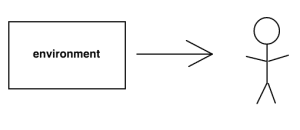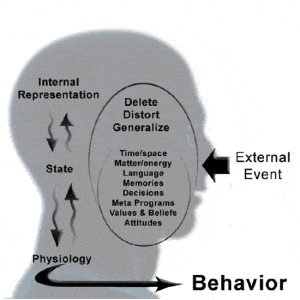Originally published on DuffMcDuffee.com By Duff McDuffee
No one else “causes” your thoughts, feelings, or behaviors. This is an impoverished model of reality.
In this cause-effect model, people do things and you have a response. That’s the whole model. There are no choice points in this model. You are a robot, programmed by your environment.
As you can see, it looks pretty simplistic. If you are operating under this model, there appears to be nothing you can do.
Here’s a more robust model. People do things, you receive sensory inputs that are already deleted and distorted, then you make rapid nonconscious evaluations of these sensory inputs based on your unconscious filters (meta-programs), belief systems, and what you are focusing on, both affecting and affected by your physiological state, and recorded in internal sensory representations, which then influence your behavioral responses.
You can choose how your respond to these nonconscious evaluations, or even work to change them. You can deliberately associate new states to specific contexts and even cultivate high-performance states or states of Beingness or Wholeness. You can change internal representations (sub-modalities) and belief systems, and possibly even your meta-programs. You can even change which environments you put yourself in, or design elements of your environment to be more supportive.
You are not a robot, you are a human being.
Which would you prefer to be, a robot or a human being?
Remember, no model of reality is reality itself. The menu is not the meal. No picture is the thing photographed, no matter how many megapixels the camera has.
But one criteria we can use to evaluate maps of reality is how useful the map is.
The belief that others cause your responses itself causes tremendous needless conflict and drama in relationships.
Neither are all your thoughts, feelings, and behaviors in your immediate conscious control. That model is also problematic. You can’t just control your reactions as easily as you lift your arm. But they are still your responsibility to manage and/or change over time, if necessary.
And luckily there are effective methods for doing so.
That’s what NLP and Hypnosis do: change things not normally in your conscious control.
Tricky Ways Humans Dodge Responsibility
One particularly “meta” way this cause-effect pattern shows up in relationships is the belief that “I am resourceful and feel good except when my partner does not. You see, when they get triggered, that triggers me! It’s their fault! I’d be resourceful if it wasn’t for them!”
You see how this works? Your unresourceful state determines my response. I am not responsible for my thoughts, feelings, and behaviors.
But of course your partner has the same belief, so where do you go from here?
I only feel bad because of that look on your face, which causes me to say not nice things to you, which causes you to yell at me, which causes me to slap you, which causes you to launch thermonuclear weapons at my nation, which of course forces my hand to retaliate due to my pre-commitment to Mutually Assured Destruction, and now the planet is uninhabitable.
We’re all victims here!
A similar situation shows up in critics of trigger warnings. “Trigger warnings are wrong and bad, and I am very upset by other people choosing to use them and saying it is helpful for them!”
Same thing: other people determine my responses. If everyone agreed with me, I wouldn’t get upset. But since people have different values, political beliefs, and practices, I am not responsible for my response. It’s their fault.
Now that said, it is not “wrong” to feel angry, sad, despairing, depressed, scared, anxious, etc. It might not be optimal, but it isn’t an ethical problem per say.
Yelling at someone or hitting someone because they are “causing” you to feel bad, that’s an ethical problem.
Ok, but what do we do if we find ourselves automatically reacting in ways that aren’t useful?
The Choice is Yours
First you must decide to adopt a different map of reality. It’s like stepping into another dimension, acting as if you have radical autonomy.
Even when you can’t immediately control your reaction in the moment, you can go up a level and control your meta-reaction to your reaction, labeling your reaction (“I’m feeling angry”), observing your reaction (“I notice I am speaking loudly”), or even having self-compassion for your reaction (“welcome, angry part of me”). Meditation helps train this meta-cognition.
If you hold a gun to my head and tell me to scream at you, I could choose not to. It may or may not be the best choice in the situation, mind you, but even if you threaten my life, you cannot force me to do as you say.
The Ancient Greco-Roman Stoics used to talk about this all the time, primarily because many philosophers at the time were enemies of the state and were in fact tortured, exiled, and killed.
Socrates was the famous example: he sentenced for “corrupting the youth of Athens” by getting them to question everything, and was condemned to die by self-administered poison, a common form of capital punishment at the time.
Socrates had a chance to escape by running away, but he chose instead to drink the cup of hemlock, considering death nothing bad compared to a breech of character. His was the ultimate act of autonomy — he would not be coerced, even with the threat of death, and his example inspired many other schools of philosophy including the Stoics.
How to Develop Autonomy
But Socrates worked at developing his will. Most of us haven’t developed our character to the point where we’d be able to make such a choice, hence why his example was so inspiring.
In order to be morally culpable, it is necessary that one has choice. You cannot be morally blamed for being born with black skin or a particular gender, which is one reason racial and sexual discrimination is inherently unjust.
But earlier I claimed that one can be responsible for something that they do not have immediate conscious control over. This is seemingly a contradiction.
The contradiction can be resolved by considering one’s character development through time. It is not possible to control all my automatic emotions, thoughts, and behaviors at any given moment. But over time, it is possible to change these responses, and it is up to me to do so. (This is a reason why children are given lesser sentences for crimes.)
There are two basic approaches to changing automatic thoughts, feelings, and behaviors:
- Develop more executive control in general.
- Change specific automatic responses using techniques designed to change them.
Socrates focused primarily on #1, because that is the only thing that existed in the 5th Century BC. Most contemporary people also focus primarily on developing more rational, willful executive control. But ironically, developing conscious Will typically involves the cultivating of automatic, unconscious habits, like exercising regularly, or meditating at the same time every day, or getting more quality sleep at night. Conscious control quickly becomes unconscious control, and making healthy choices makes it easier to make more healthy choices.
When developing more executive control, we focus on using the tiny amount of willpower we currently have and expanding it gradually over time, usually through the development of unconscious habits. The Mini Habits and Tiny Habits approaches to behavior change utilize this by chunking down a habit into something so small it doesn’t tire our limited willpower resources at all, then using this leverage to develop a full-sized habit. Implementation Intentions (aka if-then planning) also help create “automaticity” by linking a sensory-specific trigger with a specific behavior.
So ultimately #1 becomes #2, finding and applying good techniques for unconscious change.
Good Change Techniques = More Autonomy and Freedom
Since most of our cognitive processing is automatic and unconscious/nonconscious, the best way to change our automatic responses is to learn and practice effective strategies for doing so. This is what NLP and Hypnosis are designed to do, and why I am so excited about them.
If you are looking for facilitation (from the French “facile”, to make easier), you can hire me as your coach. I can help you to make any number of changes in your automatic thoughts, feelings, and behaviors, using a huge toolbox of change methods I’ve learned since 2003.
To get started, click this link to schedule a free 15-minute consultation.








